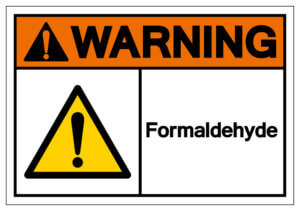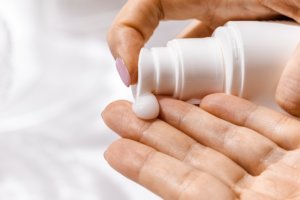Scented skincare products are everywhere. Unless you actively avoid them, you likely use one (or more) of them in your skincare routine already.
Most of us have an emotional attachment to scents we enjoy, so it’s really no wonder that most skincare manufacturers want their products to smell a certain way. And, of course, who doesn’t want to smell nice after applying lotion, face cream, etc.?
Unfortunately, there’s a much darker side to the ingredients used to give products an appealing scent, and it goes by the name of ‘fragrance’.
Fragrance is not an ingredient you want to be applying to your skin for many reasons. In fact, it remains at the top of the list of worst toxins you should be avoiding in skincare.
Fragrance: What’s the Big Deal?
Fragrance seems like an innocent enough ingredient to see listed on a label. It’s a familiar word and conjures up pleasant images of sweet-smelling flowers or aromatic spices.
However, the real meaning behind fragrance is an entirely different story.
To put it simply, ‘fragrance’ is a catch-all term that refers to a usually toxic cocktail of chemicals that give a product scent. There are over 3000 synthetic chemicals that are currently used to add fragrance to skincare, including many that are derived from petroleum.
Of course, you’ll never see these chemicals listed on the label.
They all get to hide out under the umbrella term of ‘fragrance’, which means you have no way of knowing how many additional chemicals are in the product you’re using or what they are.
More Problems with Fragrance in Skincare

One of the biggest, hard-to-miss problems with fragrance in general is exactly what we just mentioned— the fact that it’s so secretive.
Companies do not have to list all the separate ingredients that go into their scented cocktail. This is allowed in the name of preserving “trade secrets”, but all this outdated loophole really does is prevent you from being informed about what’s really in your personal care products.
Even worse is the fact that many common fragrance ingredients are toxic to your skin and your health.
In the U.S., the skincare and cosmetics industry is highly unregulated. Ingredients are not required to be free of adverse health effects before going on the market, and many chemicals that are banned in other countries are still unrestricted by the FDA.
When you apply these chemicals to your skin, not only are they in contact with your body for hours at a time, they also have the chance to be absorbed more deeply into your skin and even into your bloodstream.
This can lead to some serious effects that we’ll cover later on.
Where Fragrance Hides Out in Skincare
Fragrance is so prevalent that it’s nearly impossible to avoid unless you do so intentionally.
Any product in your skincare routine can contain fragrance, not just the more obvious ones like perfume or cologne. Make it a habit to scan the label for this dubious ingredient before buying a new product. Remember to also look for aliases, like the fancy-sounding ‘parfum’.
Here’s a list of some specific skincare products that are likely to contain fragrance:
- Body lotion
- Soap
- Facial cleansers
- Facial moisturizers
- Anti-aging products (serums, eye cream, etc.)
- Hand lotion
- Lip balm
- Sunscreen
- Deodorant
Ideally, you want to check any product that comes into contact with your skin for fragrance, but be especially mindful of those that sit on your skin for long periods of time (lotion, anti-aging products, etc.).
Specific Dangers of Fragrance in Skincare
What are the risks of applying a product that contains fragrance to your skin?
Well, the answer depends somewhat on which specific fragrance chemicals are used in your products— something you won’t be able to tell from reading the label. However, there are a few common dangers to be aware of that are associated with scented skincare as a whole.
Allergic Reactions & Skin Sensitivity

Fragranced products are one of the biggest triggers for allergic reactions worldwide. Some research shows that up to 1/3 of people are likely to have an immediate reaction to scented products, including symptoms like migraines and asthma attacks.
When it comes to topically applied products (i.e., skincare products), contact dermatitis is a frequent symptom, especially for those with sensitive skin. Hives, redness, and irritation are also common skin reactions to fragrance.
Even if you don’t notice any immediate symptoms after applying a scented product, that doesn’t mean it’s not affecting your skin.
Fragrance chemicals do their work by means of a volatile reaction. This reaction is what sends out an aroma to your nose until the chemicals are “used up” and the scent fades.
Sadly, these volatile reactions are typically sensitizing for your skin. You may not notice any irritation right away, but sensitivity will build up over time. It can contribute to skin inflammation down the road and potentially even accelerate skin aging.
Hormone Disruption & Other Health Problems
The effects of fragrance chemicals go more than skin deep.
Remember, anything that is applied to your skin has the potential to be absorbed into your bloodstream and affect the rest of your body. Certain unstable chemicals (known as volatile organic compounds or VOCs) can also go airborne, causing you to inhale them.
This is a huge problem because numerous fragrance chemicals have documented toxic effects.
Specific “worst offender” chemicals will be listed later in this article, but to give you a quick overview, many of these chemicals are linked to hormone disruption, neurotoxicity, birth defects, and respiratory issues. Several are even known or suspected carcinogens.
Environmental Damage

The effects toxic chemicals have on human health is reason enough to move on to better alternatives. But unfortunately, the damage doesn’t stop there.
Just like in so many other industries, the synthetic chemicals used in fragrance find their way into the environment. They escape most easily when sprayed or vented into the atmosphere but can also get into the water supply when washed down the drain or soaked off in oceans, lakes, etc.
The manufacturing of fragranced products is another huge polluter, and countless chemicals can get into the environment during this process.
Chemical pollution is one of the biggest challenges of modern times— a threat to both the planet and the humans living on it. With some researchers now saying that this type of pollution has already passed “safe limits”, it’s incredibly important to cut back on chemical usage in all areas, including fragrance.
Worst Fragrance Chemicals Lurking in Skincare Products
There’s no way to know exactly which chemicals are present in a product containing ‘fragrance’ unless the company chooses to disclose them. But there are some common “worst offenders” that you should be aware of.
This isn’t an exhaustive list, but it should give you a picture of exactly why fragrance can be so harmful to your health.
Phthalates
Phthalates are problematic chemicals that can be found in thousands of products. In fragrance products, they help scents to last longer and are usually found in the form of diethyl phthalate (DEP).
Banned in several other countries, phthalates are endocrine disruptors linked to decreased sperm motility and reproductive toxicity. They have also been connected to lower IQ levels in children with prenatal exposure.
Formaldehyde

Formaldehyde is a known human carcinogen and skin irritant, but it’s still used in personal care products. Even though it doesn’t smell good at all, formaldehyde can be added to fragrance as a preservative. In other cases, it may form when other fragrance chemicals react with ozone in the atmosphere.
Synthetic Musks
Synthetic musks show up most often as ingredients in perfumes, but they can also be used in soaps and other skincare products. Despite being one of the most popular scents, these chemicals are highly toxic and linked to hormone disruption, reproductive toxicity, and brain, liver, and lung cell toxicity.
Synthetic musks are especially concerning because they accumulate in your body, which can increase their effects over time. They go by names like musk ketone, musk xylene, galaxolide, and tonalide.
Styrene
Styrene is a chemical found in car exhaust and cigarette smoke, so you might be surprised to learn that it’s also a fragrance ingredient. This is bad news because styrene is classified as a probable human carcinogen and linked to both liver and nervous system damage.
Benzophenone
Benzophenone is commonly added to personal care products as a fragrance enhancer and to help preserve scent and color during exposure to UV light. It’s linked to problems like hormone disruption and is considered a possible human carcinogen.
A derivative of benzophenone, oxybenzone, is also a fragrance ingredient. This chemical is very problematic in skincare because it absorbs into skin easily and can accumulate in your blood, kidneys, and liver. It also has potential reproductive and hormonal effects.
Acetaldehyde
Acetaldehyde is yet another commonly used fragrance chemical. It imparts a fruity scent to products but unfortunately has toxic effects as well. Most notably, acetaldehyde is associated with toxicity to the kidneys, nervous system, reproductive system, and respiratory system AND is a suspected carcinogen.
(Note: Acetaldehyde is present naturally in certain plants, but the main problem is the synthetic version, which is used frequently in fragrance.)
Chloromethane
Chloromethane is a chemical present in perfumes and numerous other scented products. It’s one you want to avoid, since this chemical is linked to harmful effects on the nervous system as well as liver, kidney, and skin toxicity. Again, you probably won’t see it on the label, but it’s another reason to avoid fragrance altogether.
Beware of ‘Fragrance-Free’ & ‘Unscented’ Skincare Products

By now, you should have a pretty clear answer to the question of: How bad is fragrance in skincare?
The bottom line is that for the sake of your skin and your health, it’s really best to avoid this dubious ingredient altogether.
However, this is where yet another obstacle trips up many consumers— so-called fragrance-free and unscented products.
You might think from the name that these products would not contain fragrance, but this isn’t always the case. Many products that claim to be unscented contain what’s known as “masking chemicals”, which are essentially fragrance chemicals used to cover up the unpleasant smell of all the other chemicals present in that product.
Don’t be pulled in by marketing claims like ‘fragrance-free’, ‘free and clear’, or ‘unscented’. Instead, always scan the label to see if fragrance (or parfum) is listed— and steer clear if it is.
How to Choose Better Skincare Products
Choosing clean, good-for-you skincare products starts with label reading.
If you see fragrance listed as an ingredient on any product, put it back on the shelf. The only exception to this is if the manufacturer fully lists out their fragrance ingredients and they all check out as non-toxic.
For many people, especially those with sensitive skin, the best option is to simply use skincare with no added fragrance. These products can be a bit difficult to find, but the effort is well worth it for your skin and health.
A second option is to use naturally scented products.
However, be aware that the word “natural” is very loosely regulated when it comes to skincare products in the U.S. You’ll want to actually read the label to make sure the only fragrance in a specific product comes from pure essential oils or other types of plant extracts.
To absolutely ensure no fragrance chemicals (or any other synthetic toxins) have been added, search for USDA Certified Organic skincare products. This official certification is one of the few assurances you have that a product is as natural as it claims to be.
Anti-Aging Skincare Without the Fragrance Chemicals
If you would like to start a highly effective anti-aging skincare routine with zero fragrance chemicals— or chemicals of any kind— look into the Age-Defying Dream Cream from Purity Woods.
This carefully formulated cream is made solely from nature’s most powerful botanical ingredients. You won’t see the word ‘fragrance’ anywhere on the label because the gentle scent of the cream is derived completely from real plant extracts that all have anti-aging effects.
The Dream Cream also has the added benefit of being USDA Certified Organic, so you won’t have to worry about any other synthetic ingredients, either. What you will notice is how effectively it erases the appearance of wrinkles, fine lines, dark spots, etc.
Learn more about the Age-Defying Dream Cream here, and remember to always watch out for fragrance in your skincare products!


